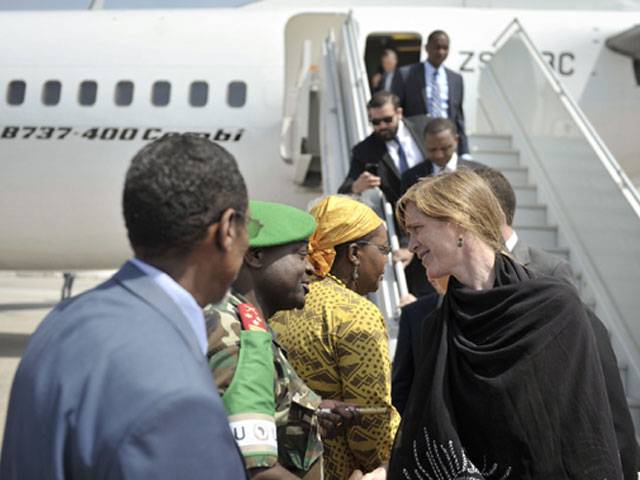MOGADISHU - UN Security Council ambassadors met Somalia's president Wednesday under heavy security in the war-ravaged capital Mogadishu, ahead of a fresh military push against Islamist fighters. The visit comes amid growing warnings of a humanitarian crisis in Somalia, three years after more than 250,000 people, half of them children, died in a devastating famine. The UN-mandated African Union force provided armed guards for the diplomats, as they visited their fortified base at Mogadishu airport, where they met President Hassan Sheikh Mohamud and top government officials.
Somalia's hardline Shebab Islamists are fighting to topple the internationally backed government.
The envoys did not travel outside the airport's concrete blast walls, manned AU machine gunners, to travel further into the dangerous city itself.
But the UN diplomats said they were committed to supporting the Somali government revise the national constitution - and hold a referendum on it by 2015 - before elections in 2016, the first popular vote for decades.
"The members of the Security Council stand ready to support the people and government of Somalia to deliver this vision," Britain's ambassador to the UN, Mark Lyall Grant said in a statement, calling on the government to "urgently establish a national independent electoral commission".
But the Al-Qaeda-linked Shebab continue to launch attacks even in the heart of Mogadishu, including recent brazen commando raids on the presidential palace and parliament.
The United Nations has also warned that Somalia is sliding back into an acute hunger crisis, with more than 350,000 people in Mogadishu in need of food aid and parts of the city facing emergency levels just short of famine.
Somalia's government, selected in a UN-backed process in 2012, was widely hailed as offering the best chance in decades to repair the war-ravaged country.
But the return of extreme hunger, accusations of corruption and continued attacks even in the most heavily defended zones by the Shebab have cast a shadow over the government's record.
Shebab fighters once controlled most of southern and central Somalia, but have been driven out of fixed positions in Mogadishu and most major towns by the 22,000-strong AU force.
The AU force, fighting alongside government troops, is preparing "to launch the next phase of military operations against Al-Shebab," the UN mission in Somalia said in a statement.
A key target, one of the last few major settlements still in Shebab hands in southern Somalia, is expected to be the port of Barawe.
Tuesday, April 16, 2024
UN Security Council envoys visit war-torn Somalia

Caption: UN Security Council envoys visit war-torn Somalia
IHC dismisses Bushra Bibi's plea seeking her shifting to Adiala Jail from Bani Gala
4:25 PM | April 16, 2024
Punjab CM visits Tehsil Headquarter Hospital Murree
3:25 PM | April 16, 2024
High-level Saudi delegation in Islamabad to hold meetings with Pakistani leadership
2:07 PM | April 16, 2024
Saudi foreign minister meets PM Shehbaz Sharif
1:17 PM | April 16, 2024
Decision to retaliate against Iran attacks rests with Israel, says Pentagon
1:05 PM | April 16, 2024
Political Reconciliation
April 16, 2024
Pricing Pressures
April 16, 2024
Western Hypocrisy
April 16, 2024
Policing Reforms
April 15, 2024
Storm Safety
April 15, 2024
Democratic harmony
April 16, 2024
Digital dilemma
April 16, 2024
Classroom crisis
April 16, 2024
Bridging gaps
April 16, 2024
Suicide awareness
April 15, 2024
ePaper - Nawaiwaqt
Advertisement
Nawaiwaqt Group | Copyright © 2024





